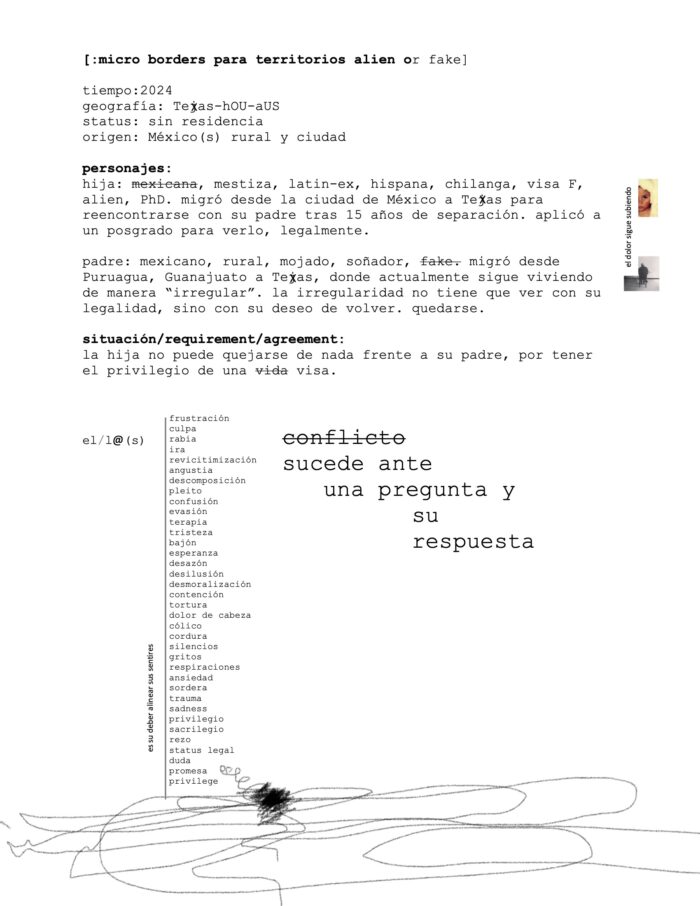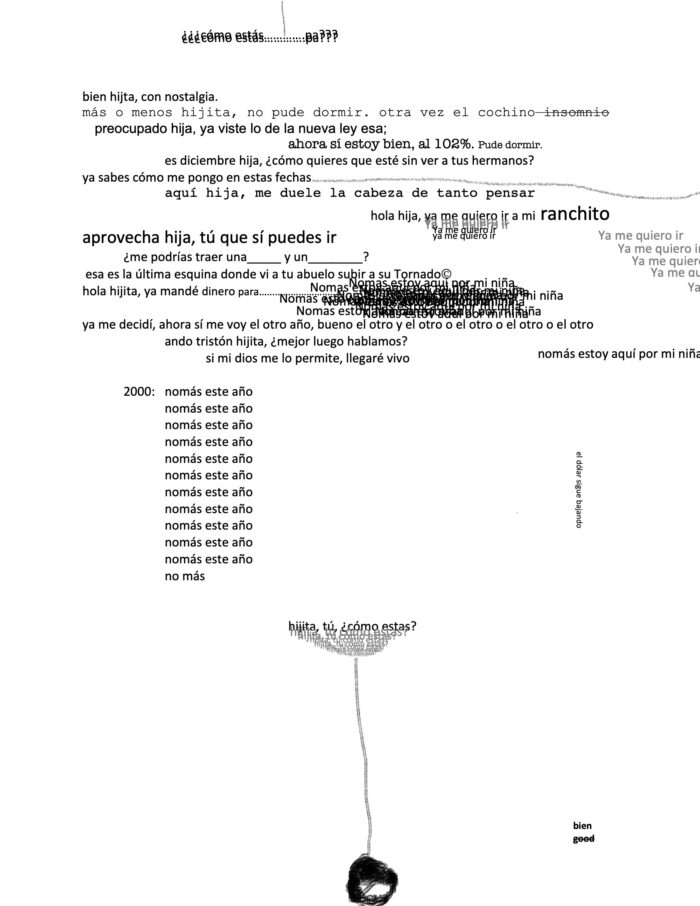Maribel Bello’s poetic-dramatic-dialogue, “[:micro borders para territorios alien or fake]” demands that we inhabit uncertainty, misunderstanding, discomfort, and irregularity. This is true because it focuses on the relationship between a “visa F” daughter pursuing her PhD in the US and her “mojado” father, which has been fractured “tras 15 años de separación” due to undocumented migration, but also because the language, genre, style, and even the font of the piece is constantly shifting and unstable. As such, “micro borders” requires that we occupy the condition of migration and the role of the migrant in the aftermath of forced family separation and tentative reunification. Like the relationship between hija y padre in “micro borders,” neither the condition of migration nor the piece itself follow a coherent narrative or point towards any kind of resolution. They are irregular, a word that Bello refers to when she introduces the father as one of the two “personajes” of the poetic-dramatic-dialogue, alongside la hija.
The notion of “lo irregular” stands out because it is one of several examples in the piece of a word or idea that could seem to mean one thing but actually means another; that refers to multiple meanings at the same time; or that could be written in either Spanish or English. Bello tells us that the father, who migrated from Puruagua, Guanajuato to Tej/xas (she layers the x over the j as if correcting her language from Spanish to English), continues to live there “de manera ‘irregular.’ la irregularidad no tiene que ver con su legalidad, sino con su deseo de volver. quedarse.” It is telling that Bello is compelled to correct any assumptions about the father’s irregular status in terms of his legal right to be in the US. We understand that the father is undocumented, since the daughter “tiene el privilegio de una vida visa” while he constantly fears deportation and cannot leave the US. But the true meaning of his irregularity lies in his conflicting desire to both return to México and to stay in Texas; to be with the daughter he has finally reunited with and to be with his other children who remain in México. The contradiction that the father lives reminds me of the condition of being “ni de aquí, ni de allá” that many migrants and Chicanxs/Latinxs identify with, but his undocumented status legally bars him from occupying either American or Mexican space. For the father, to be “ni de aquí, ni de allá” is a literal condition that never has the privilege of metaphor.
Such irregularity persists and multiplies throughout the piece, constantly highlighting barriers that return us to the conditions of il/legality and undocumentation. But the irregularity of migration and the migrant condition also reveals unexpected possibilities. Although family reunification is certainly an expected reason for migration, Bello proposes a means of reunification that the media and general public rarely consider, through the daughter’s PhD studies with her “visa F.” Postgraduate study becomes more than just a path to a degree or career, it is way to control the process of migration, making it legal and choosing the location to be close to the father. Dominant media narratives don’t accept the image of a young mexicana, mestiza, latin-ex, hispana, chilanga daughter pursuing a PhD in the US, or having choice and control over their migration process.
And yet, despite the choices and control available to her, the daughter’s emotional – and metaphorical – barriers stemming from migration resemble those of her mojado father. Just as the father’s un/documented status is uncertain – for he can never be sure what “la nueva ley esa” will mean for him – the relationship between father and daughter is uncertain. Their relationship, which bears the trauma of 15 years of separation, is contingent upon not talking about certain feelings and emotions, although the daughter especially feels constrained because of her legal status. Bello lists the forbidden feelings and emotions between hija y padre in the piece, but crosses out the word conflicto, possibly as a sign of the missed opportunity to explore her trauma and pain with the father. Despite, but also because of their common trauma, hija y padre are unable to truly communicate with each other. The things they cannot talk about are mostly in Spanish: “frustración,” “culpa,” “rabia,” “ira;” with just a few in English: “sadness,” “privilege,” perhaps representing feelings and conditions that the father would be less able to understand. A few of the things they cannot talk about could be read in either Spanish or English: “trauma,” “status legal,” perhaps representing feelings and conditions that affect them both, across borders. But the distance between hija y padre is much more prominent throughout the piece, variously reflected through their roles as “personajes” in a performance-like setting, the intersecting and clashing vertical and horizontal text, or the scribbles and black blobs at the bottom of each page.
Thus, “micro borders” insists that not only are the dominant narratives about undocumented migrants and migration usually wrong, their “real” or true stories are very often illegible and unknown, even to the migrants themselves. Bello demonstrates the illegibility and irregularity of these stories and relationships through the black scribbles and blobs at the bottom of each page. When the father finally asks his daughter, “hijita, tú, cómo estas?,” there is only one acceptable answer: “bien good.” But the illegible, unspoken truth literally lies beneath the question in a form of a menacing black ink blob, precariously balanced on the thinnest line of text. While the black blob may be illegible, it is definitely visible, revealing the trauma that la hija, el padre, and all migrants and family members touched by un/documentation hold inside, waiting to burst forth.

